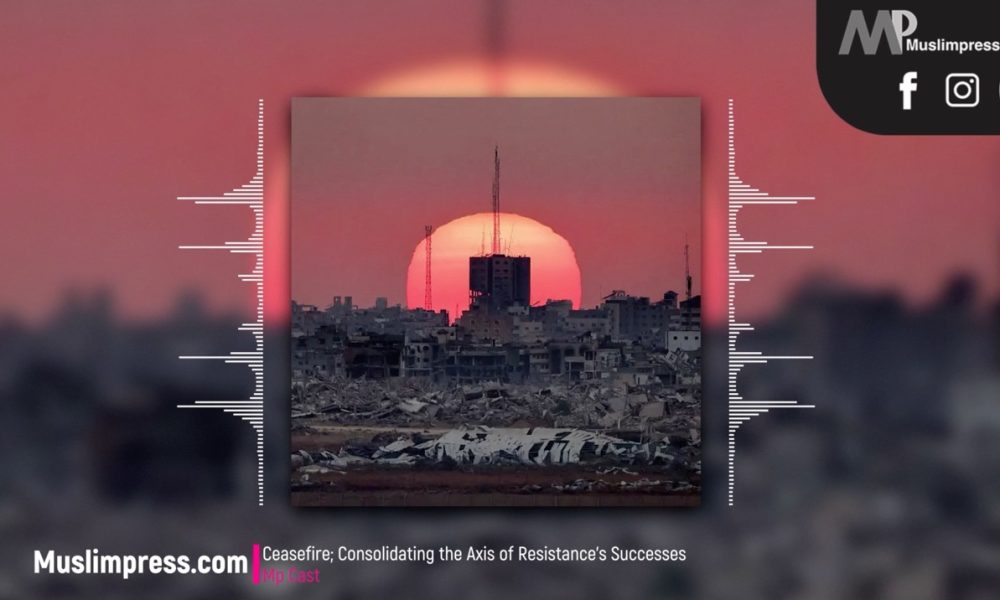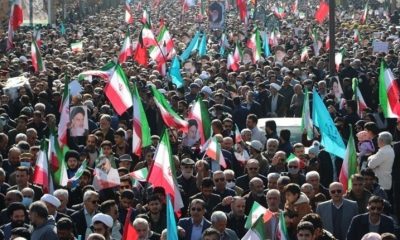Media
Ceasefire; Consolidating the Axis of Resistance’s Successes
following the announcement of a ceasefire and discussions regarding the exchange of prisoners between the two sides and other provisions of the permanent peace plan agreement or the end of the war, Israel is not in a position of absolute, unchallenged power in the region. Instead, it finds itself grappling with internal challenges and new regional pressures.
New capabilities for the Resistance have emerged, and, more importantly, the morale of the Resistance is currently in a very good state after dealing a severe and heavy blow to the entity of the regime. The necessary confidence to confront the Zionist regime exists within the Resistance to a significant degree. Presently, the opportunity for a ceasefire, after the dust of Netanyahu’s crimes and extremist violence and the intense anger of the Zionists has settled, has emerged for the Axis of Resistance to conduct a fair assessment of past conditions as well as future events.
The Collapse of the Regime’s Security Barrier
One of the fundamental effects of the Al-Aqsa Storm operation was shattering the perception of Israel’s absolute security. This operation challenged the implied military and intelligence superiority of the regime and demonstrated that the Resistance possesses the capability to infiltrate, strike, and establish deterrence. This is a matter of significance for the Zionist regime from several perspectives. Firstly, the regime has always engaged in extensive propaganda regarding its ability to control and create security in a place where its people have historically hated it forever. This means that for many years, the regime presented a spectacle of glorious authority and the ability to control people who might have completely opposed it, claiming not that they lacked the capability, but that they no longer had the will to resist. However, the Al-Aqsa Storm clearly demonstrated that both the will and the capability for resistance exist.
On the other hand, for years, under the pretext of providing security for Zionist people who are expelled, rejected, and not accepted by communities around the world, the regime claimed that they could live in complete security within the occupied territories. Using this very pretext, it had managed to attract various waves of Zionist immigration from all over the world to the occupied territories over the past eighty years. However, the Al-Aqsa Storm operation drew a line through that claim, and we effectively witnessed reverse migration from the occupied territories back to their countries of origin or ancestral homelands. The regime’s claimed security became a thing of the past with the Al-Aqsa Storm operation, and Zionists are forced to leave the occupied territories to protect themselves and their families.
Furthermore, the Al-Aqsa Storm operation was highly significant because it clearly showed that despite the regime’s technological advancements being quite dazzling, and the unlimited support it has received over the years being fundamental and undeniable, the ideas and creativity of the Axis of Resistance can design and execute an operation as extensive and sophisticated as the Al-Aqsa Storm. The ineffectiveness of the regime’s advanced and state-of-the-art systems and technologies was proven to all. The regime’s security and intelligence failure in this operation is noteworthy from this aspect as well.
The loss of credibility for Benjamin Netanyahu and his intelligence and security organizations (Aman, Mossad, Shin Bet, and the Shabak, and the Shiloah Institute for Security Studies) during this operation is considered one of the noteworthy and highly significant points of the Al-Aqsa Storm. Additionally, the fragility of the regime’s security structures was displayed during this operation. Therefore, it can be succinctly stated that the Al-Aqsa Storm operation created a defeat for the regime that is irreparable. This defeat is not just for Netanyahu’s premiership; rather, it represents a failure of an eighty-plus year effort by arrogant powers to enforce forced geopolitical changes and ethnic cleansing.
However, currently, with the temporary ceasefire, the regime is in a position where it must maintain a balance between its own excessive demands and limiting costs. For everyone knows that a ceasefire does not mean the end of the war, but rather an opportunity for internal rebuilding, diplomatic pressure, and planning for the next stages of the Resistance. This is because the Resistance will persist as long as the regime’s occupation continues, and it will exist until it achieves its ultimate dream and ideal, which is the expulsion of the Zionists and the liberation of Palestine.
It should be noted, of course, that within Israel, political and social pressures against the criminal gang ruling the occupied territories are increasing day by day. Protests against Netanyahu’s personal government, accusing it of trying to weaken the judicial system and criticizing the prolonged wars and their zero achievements, show that the Zionist people are also tired and have serious criticisms regarding the heavy costs and lack of a stable outlook. Now, in such conditions, the linkage between the collapse of the regime’s security barrier and the discussion of economic challenges and socio-political crises has led us to witness the collapse of the weak and flimsy castle, like a spider’s web, of the usurping Zionist regime.
Ceasefire; Consolidating the Axis of Resistance’s Successes
The Gaza war ceasefire and the accepted peace plan in Gaza are significant from several aspects. First, this plan will lead to the consolidation of the successes and achievements of the Axis of Resistance. Second, the regime’s acceptance of the ceasefire means admitting defeat and acknowledging the power of the Resistance. It also means that the Zionist regime was forced to obtain through ceasefire acceptance, concessions, and win-win negotiations what it could not achieve through war and force. Additionally, the ceasefire, because it was not aligned with the regime’s intention and inherent nature, signifies its coercive and imposed nature for them.
The Israeli government, while forced to accept the ceasefire, still finds itself in a position of internal weakness. The cabinet faces pressure from extreme right-wingers, such as Ben-Gvir, who have repeatedly entered the Al-Aqsa Mosque with provocative actions and issued harsh slogans against the Resistance, thereby disrupting a sensitive religious and political balance. Internally, dimensions of corruption, legal weakness, and efforts to curb the judiciary have resurfaced. The criminal gang ruling the occupied territories is also trying today to gain more power in supervisory bodies and the judiciary, indicating the inefficiency of the illegitimate governance of the Zionists. Popular protests over the fruitless continuation of wars without achieving success or tangible results, and the disregard for the situation of the hostages over these past two and a half years, continue. These are demands that the government cannot ignore and for which it truly lacks appropriate and correct answers.
On the other hand, the prolonged war and extensive military operations have imposed heavy costs on Israel’s economy; financial resources, the banking system, internal security, and the people’s standard of living are facing serious pressure. The erosion of public trust in the government and the army, especially after the display of weaknesses in security and crisis management, have effectively left the legitimacy of the current Israeli government’s governance shrouded in ambiguity. Presently, the regime’s economic and social resilience is being tested more than ever before, and a sudden drop in economic indicators could lead to even more severe dissatisfaction, reduced foreign investment, and increased internal pressures.
Meanwhile, the regime knows that the Resistance will not end with the ceasefire but will likely challenge the regime’s security again in the near future to reclaim its rights. Therefore, it seems that the Resistance should not be content with the ceasefire; rather, it must continue pressure on Israel by combining diplomacy, deterrent power, and regional allies. An equation that can keep Israel in a stalemate and make the cost of its aggressions heavy and unpayable by the regime – in this scenario, the Resistance can secure its interests and also make the regime regret its criminal actions. The continuation of pressure, recovering and rebuilding strength, reinforcing strong points, and rectifying weak points constitute a new model for the future of the Resistance during the ceasefire period.
Final Remarks
It should be noted that it is wise not to be deceived by the appearance of the ceasefire; what is important is the post-ceasefire process. If the Israeli regime cannot extract any benefit for itself from the halt in war, naturally it may want to start this war again. Also, the Axis of Resistance must inevitably use the ceasefire opportunity for political convergence, force rebuilding, and strengthening internal capacities. On the international stage, legal, media, and public opinion pressure must proceed in parallel with military resistance to double the cost of Israel’s occupation. Rectifying weaknesses is a priority at this stage. The regime is in a position of weakness after the ceasefire, and consequently, the Western-Hebrew Axis is inevitably bringing all its power to support, assist, and restore the regime’s capability. Naturally, the Axis of Resistance must do likewise and, by rebuilding its own strength and power, place itself in a better position for the future.
In this situation, Israel is now not the absolute, invulnerable superpower it portrayed itself to be in public opinion and its media propaganda, but rather a regime with chronic internal weaknesses, economic pressure, and shaky legitimacy. The Al-Aqsa Storm operation is not the end of a battle, but rather the beginning of a new chapter of resistance, a re-reading of power, and a redefinition of regional policy for the free-spirited people of the region. It is a chapter that has placed Israel under the pressure of constant constraints and has opened up a broader horizon for the future of the Resistance. If the Resistance manages this opportunity wisely, a new period of regional equations will be shaped – a period where Israel can no longer make decisions based on the presumption of absolute superiority, but will be forced to pay the cost for its aggressions and crimes, a cost that will sometimes exceed its perceived capacity and limits
-

Ceasefire; Consolidating the Axis of Resistance's Successes


You may like
-


Two million Israelis need psychological support following Gaza war
-


Iranian People Unite to Condemn Rioters, Defend Islamic Republic
-


Fact Check: Did Iran Introduce a $7 Payment to Quell Recent Unrest?
-


Islamophobes have achieved fame and fortune from criticizing Islam and Muslims
-


There was no such thing as humanitarian terrorists, analyst said of The White Helmets
-


‘U.S.-Israel-Saudi Arabia coalition in Mideast is the latest Axis of Evil’


Two million Israelis need psychological support following Gaza war

SURA 57. Hadid, or Iron

SURA 50. Qaf

Iran, China, and Russia to Hold Naval Exercise

V Energy-saving tips and tricks

10 Tips for Employees

How to be Happ?

Let’s use it right

V Energy-saving tips and tricks

SURA 50. Qaf

Two million Israelis need psychological support following Gaza war

Trump’s Worst Nightmare: How a Muslim Mayor Is Reshaping New York—and Challenging the Status Quo

Italian journalist participates in Arbaeen, Iraq

Qisas In Islam

Since the start of 2024; info motion

